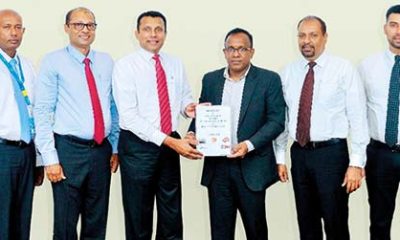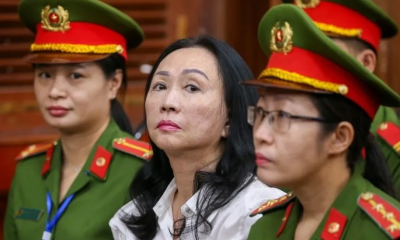Editorial
Monsters and Masters

Monday 20th September, 2021
No sooner had Hambantota Mayor Eraj Fernando (SLFP) been arrested yesterday for trespassing on a land in Bambalapitiya recently and assaulting two security personnel guarding the property than he was given police bail. It looks as if the police had been eagerly waiting for his arrival to grant him bail! He is sure to come out with a tall tale in bid to justify his unlawful action. This is not the first time he has allegedly committed trespass. In November 2020, a video circulated on social media showed him and his men engaged in a brawl with some persons over a land dispute in Nugegoda. He sought to justify his action, and received kid glove treatment from the police.
The Rajapaksas have created quite a few monsters, who enjoy unbridled freedom to violate the law of the land. During the previous Rajapaksa government, Fernando, as the Mayor of Hambantota, tried to harm a group of UNP MPs, who visited the Hambantota Port and the Mattala Airport. He was shown on television, carrying a small firearm and chasing the MPs, who luckily managed to escape. He got away with his crime; his political masters claimed he had been brandishing a toy pistol! After President Mahinda Rajapaksa’s defeat in 2015, he switched his allegiance to the yahapalana government, and joined the SLFP. Thanks to an SLPP-SLFP deal, he is back in power and going berserk with impunity.
One should not lose sight of the big picture—the issue of land grabbing. Nobody’s property is safe. Organised gangs with links to powerful politicians prepare forged deeds for bare lands or unoccupied houses. The victims are helpless. Mervyn of Kelaniya was able to grab or destroy properties at will by virtue of being a member of the previous Rajapaksa government. He, too, turned his back on his political masters, nay insulted them after the latter’s fall in 2015. His criminal actions and illegally acquired assets have not been investigated although his erstwhile masters are back in power. Maybe they do not want to open a can of worms by probing his crimes. If the yahapalana government had cared to investigate him, it would have been able to uncover the crimes he had committed at the behest of his masters, but the Sirisena-Wickremesinghe administration did not go to that extent for obvious reasons. Former President Maithripala Sirisena and former Prime Minister Ranil Wickremesinghe are benefiting from the quid pro quo; the incumbent Rajapaksa government is looking after their interests as well as those of their supporters. Fernando’s release on police bail is a case in point.
Nawala Nihal, known as the God Father of Sri Lanka’s underworld, grabbed lands in Colombo, and many people had to pay him protection money. He operated freely under several governments obviously due to his political connections. Landowners in Colombo must have heaved a sigh of relief when he disappeared under mysterious circumstances in 2006, never to be sighted ever again. But the problem is far from over.
Land grabbing goes on in different parts of the country, and many victims are wary of having recourse to the law for fear of reprisal. Sri Lanka’s laws notoriously favour land grabbers and other such lawbreakers. Land cases drag on for decades and are prohibitively expensive. On 17 August, 2010, the then Justice Minister Athauda Seneviratne revealed in Parliament that it took as long 40 years for some land cases to be concluded!
Land racketeers also have the blessings of corrupt police officers, pettifoggers, and some venal Land Registry officials, and therefore, the victims are helpless. Greedy politicians and their thugs take advantage of this situation. There has to be a special police unit to probe complaints of land grabs expeditiously and action must be taken to have such cases heard speedily for the benefit of the hapless victims.
As for the likes of Fernando, the onus is on the current leaders to clean up the mess they themselves have created. When Mayors enjoy unbridled freedom to trespass, storm vaccination centres and obstruct health officials (in Moratuwa), destroy historical monuments (in Kurungeala), it is only natural that ministers think they should be able to commit far more serious offences with impunity such as barging into prisons and trying to execute inmates.
Editorial
A Norwegian example worthy of emulation

Tuesday 16th April, 2024
Ruling party politicians in Sri Lanka are unarguably more equal than others, like the Pigs in Orwell’s Animal Farm, but their counterparts in the developed world are not so lucky. Not that all politicians in the so-called five-star democracies are much better than the ones we are burdened with; the developed nations, too, have tainted politicians to contend with, but never can such characters rise above the law.
Norway’s Health Minister Ingvild Kjerkol had to resign the other day. What prompted her to step down had nothing to do with malpractices in the health sector under her purview. She had to resign owing to an allegation that she had plagiarised some academic works in her Master’s thesis, submitted in 2021. No sooner had Nord University launched a probe into the allegation against her than she tendered her resignation. She did so at the behest of Prime Minister Jonas Gahr Støre.
Going by the stern action the Norwegian government has taken against Kjerkol over a plagiarism allegation, it is not difficult to imagine what would have befallen her if she had been accused of being involved in a procurement racket at the expense of the lives of patients and the public purse. This is in sharp contrast to the manner in which the government of Sri Lanka has chosen to act in respect of the prosecution of its former Health Minister.
Keheliya Rambukwella remains a Cabinet minister in spite of facing prosecution and being held on remand for a procurement racket carried out on his watch as the Minister of Health. The allegation against Kjerkol pales into insignificance in comparison to the charges against Rambukwella, the most damning one being the purchase of a consignment of fake immunoglobulin, which has reportedly claimed several lives in government hospitals and caused huge losses to the state coffers. Having failed to prevent the prosecution of Rambukwella, the Wickremesinghe-Rajapaksa government is now doing everything in its power to make his stay in remand prison comfortable. The government unashamedly defended Rambukwella when a motion of no confidence was moved against him last year.
Curiously, the Prison Department experiences a shortage of buses whenever it has to take Rambukwella to court, and uses a van to transport him! Politicians with links to the government in power never languish in crowded cells in remand prisons; they stay in prison hospitals, instead.
Kjerkol is not alone in her predicament. Plagiarism has cost another Norwegian politician her Cabinet post. In January, 2024, Norwegian Minister of Research and Higher Education Sandra Borch had to resign when it was revealed that some sections of her Master’s thesis had been plagiarised. She lost her degree as a result. In this country, politicians’ children are said to be able to sit examinations, unsupervised, in separate rooms, where they receive help from their private tutors to answer questions, pass out and practise law, of all things.
Last year, Prime Minister Støre dismissed Norway’s Foreign Minister Anniken Huitfeldt, whose husband was exposed for making questionable financial deals that could have had some influence on her ministerial duties. Several other Norwegian ministers have also had to step down over allegations of various malpractices. Such is Norway’s determination to ensure the probity and integrity of its politicians.
President Ranil Wickremesinghe, who is the head of government, is known for his affinity for Norwegians. He went so far as to involve them in conflict resolution here in the early noughties though they were accused of being partial to the LTTE. Special Norwegian peace envoy, Erik Solheim, made no bones about his partiality to the LTTE, but President Wickremesinghe has appointed him a Presidential Advisor on Climate Change. Shouldn’t Wickremesinghe emulate Norwegian PM Støre and remove Rambukwella from the Cabinet forthwith?
Most of all, how can Sri Lanka’s creditors, whose consent for external debt restructuring is a prerequisite for economic revival here, be expected to repose trust in a government, which allows its members to enrich themselves at the expense of the public and the state coffers, and even function as members of the Cabinet from behind bars?
Editorial
Blind faith in seers

Thursday 11th April, 2024
Astrologers were clashing over the traditional New Year auspicious times or nekath, at the time of writing. Some of them are of the view that the nekath prepared by what is described as the State Astrologers’ Committee of the Department of Cultural Affairs will have malefic effects on the country. However, Minister of Buddha Sasana, and Religious and Cultural Affairs Vudura Wickremanayake has ceremonially handed over the nekath seettuwa or the table of auspicious time to President Ranil Wickremesinghe.
Everything is done in an astrologically-prescribed manner in this country. In fact, astrologers are the real eminences grises; they have politicians, including government leaders, eating out of their hand. It is they who decide when elections should be held, the only exception being the presidential polls during the tenure of a President elected by Parliament. There have been instances where they had Presidents advance presidential elections. Most citizens are also believers in astrology, which influences their lives from the cradle to the grave. If it is true that benefits accrue from auspicious times to those who observe them, how can one explain Sri Lanka’s current predicament? Why has the country had to beg for dollars and plead with its creditors to reschedule its debts in spite of following astrological guidelines to the letter?
There is no way Sri Lanka can come out of the current economic crisis without enhancing national productivity, which is the be-all and end-all of economic progress, and this is a task that requires hard work, longer working hours, and, above all, a radical attitudinal change. Everyone has to move out of his or her comfort zone and work harder if he or she is to help the country achieve economic progress. A prerequisite for realising this ambitious goal is to stop blaming others and planets and stars, and act responsibly while seeking guidance from real experts, and not self-proclaimed seers who are a dime a dozen.
The rice trick
Sri Lankan politicians do a Santa during election years. They throw public funds around generously as if they were spending their own money. They have mastered the art of bribing Citizen Perera with his own money and cheating him out of his vote. This has been going on for more than seven decades.
The SLPP-UNP government has allocated funds with a generous hand for poor relief in this election year. It has undertaken to distribute free rice among the needy families during the current festive season.
The rice trick has worked since Independence. In 1953, Prime Minister Dudley Senanayake had to resign amidst a mass uprising triggered by an increase in the price of a measure of rice, among other things. His successor, Sir John Kotelawala, had to restore the rice subsidy partially to bring the situation under control. Sirimavo Bandaranaike also played the rice trick to win elections. She promised what has come to be dubbed ‘rice from the moon’; she promised that rice would be made available even if it had to be brought from the moon, but later she imposed restrictions on the consumption and transport of rice.
In the run-up to the 1977 general election, J. R. Jayewardene promised eight pounds of cereal or eta raththal atak per week to alleviate poverty under a UNP government. His pledges were like pie crust made to be broken, and the people got nothing by way of free cereal. Chandrika Bandaranaike Kumaratunga undertook to lower the bread prices, and did not care to make good on her promise. President Mahinda Rajapaksa turned Temple Trees into a dansela of sorts by giving away food, especially on days of religious significance. His gastronomic bribes yielded the desired results, and he managed to win elections until his overconfidence overtook him.
The incumbent government, which has ruined the economy and inflicted unprecedented suffering on the public, is playing the rice trick in a bid to assuage public anger ahead of elections. But the poor do not live by rice alone, and they eat rice throughout the year, and not just during festive seasons. The vast majority of people who are struggling to dull the pangs of hunger will not get free rice even as a temporary measure. There’s the rub for the government.
Editorial
Blues red in tooth and claw

Wednesday 10th April, 2024
The latest internecine battle of the Blues, as it were, at Darley Road, has taken a dramatic turn. The anti-Sirisena faction of the SLFP held a politburo meeting, on Monday, and made some key appointments. They met at the Sri Lanka Foundation Institute because the SLFP headquarters at Darley Road, Colombo 10 remained closed. Former President Chandrika Bandaranaike Kumaratunga, who is leading the battle against former President Maithripala Sirisena, was present there, as an ‘observer’, enjoying the drama directed by her.
The SLFP politburo members who were present at Monday’s meeting appointed Senior Vice President of the SLFP, Nimal Siripala de Silva, as the party’s Acting Chairman. That is the way, they seem to think, they can save the SLFP from Sirisena, but what they have chosen to do is like handing over a lamb to a tiger to save it from a wolf!
The Sirisena faction insists that Monday’s meeting convened by Senior Vice President de Silva was illegal. It maintains that the party Constitution does not provide for such gatherings and appointments. The SLFP is likely to be embroiled in another legal battle in this election year, when it has to remain maniacally focussed on strategising for the upcoming polls.
When SLFP National Organiser, Duminda Dissanayake, was asked in a television interview on Monday night whether he thought it was proper to have convened a politburo meeting without the party Chairman, he answered in the affirmative. He argued that circumstances had warranted such action; he asked rhetorically what the party was supposed to do in the event of the demise of its Chairman. But the SLFP Chairman is alive and still going strong despite an interim injunction barring him from functioning in that position temporarily. Have his rivals left him for politically dead?
The SLFP chairmanship is a straw Sirisena is clutching at to remain relevant in national politics, and he is not likely to let go of it without a fight. Yesterday, his loyalists went to the SLFP headquarters, and made a futile attempt to have the police open its main gate, which has remained locked for several days. They returned tit for tat; they padlocked the gate before leaving the place.
Now, neither faction of the SLFP can enter the party headquarters unless an amicable settlement is reached or the gate is forced open. Thus, the SLFP has shot itself in the foot while the SJB, the UNP and the JVP-led NPP are busy with their presidential election campaigns.
Those who claim to be on a mission to save the SLFP from each other have become its worst enemies; they are trying to settle personal scores and further self-interest at the expense of it. They are red in tooth and claw, and it will be a miracle if the SLFP succeeds in turning itself around in the foreseeable future.
Sirisena has flown to Bangkok, of all places, while the battle for the SLFP leadership is raging. Sri Lankan politicians’ wanderlust is notoriously insatiable. Not even devastating terror attacks prevented some Presidents from going on foreign junkets during the war. In 2019, Sirisena, who was the then President, Defence Minister and Commander-in-Chief, was overseas at the time of the Easter Sunday terror strikes although the defence authorities had been warned of the impending terrorist attacks. Old habits are said to die hard.
Chandrika has said she came under pressure from those who detested the Mahinda Rajapaksa government to run for President, again, in 2015, but she had Sirisena fielded as the presidential candidate instead; she now regrets having done so. Thankfully, she did not contest, but unfortunately Sirisena did. A third term for President Rajapaksa would have been equally disastrous. Chandrika will have her work cut out to convince the public that she is not making a fatal mistake again by siding with another bunch of failed politicians bent on grabbing the reins of the SLFP.
It looks as if the SLFP had to be saved from its self-proclaimed saviours.
-

 Latest News6 days ago
Latest News6 days agoApril 15 (Monday) declared a public holiday
-

 Sports6 days ago
Sports6 days agoOnly if Buultjens knew that teams have pulled out of rugby sevens!
-

 Business6 days ago
Business6 days agoMallika Hemachndra Jewellers offer a glittering new year with gold and smiles
-

 Business6 days ago
Business6 days agoHNB and Ideal Motors partner up once again to offer exclusive perks on Mahindra automobiles, Powerol generators
-

 News6 days ago
News6 days agoWigneswaran considers himself best Tamil candidate to run for President
-

 News4 days ago
News4 days agoSinhala and Tamil New Year auspicious times
-

 Business5 days ago
Business5 days agoVietnamese billionaire Truong My Lan sentenced to death for $44bn fraud
-

 Business6 days ago
Business6 days ago‘NSB continued to prove its resiliency within economic shudder’

























